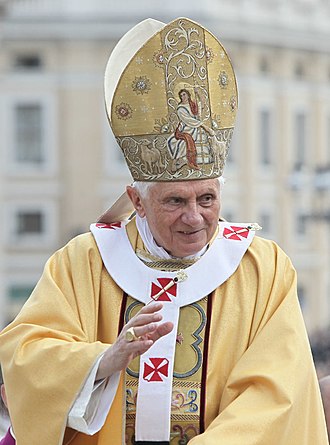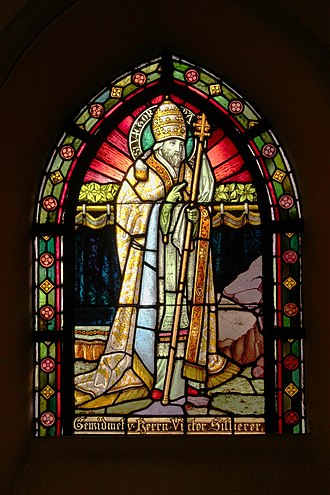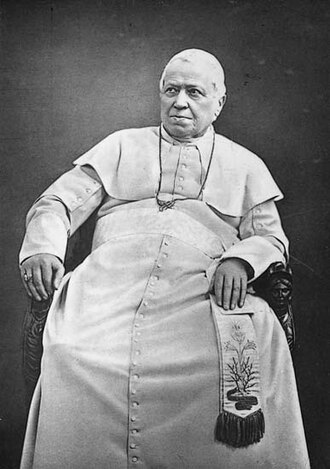Discover Your Roots
SIGN UPDiscover Your Roots
SIGN UPThe name Pope is of English origin and is primarily gender-neutral. It means "Clergy." The name is associated with the bishop of Rome and the head of the worldwide Catholic Church. From a Catholic viewpoint, the name reflects the primacy of the bishop of Rome, largely derived from his role as the apostolic successor to Saint Peter. The pope is considered one of the world's most powerful people, with extensive diplomatic, cultural, and spiritual influence on both Catholics and those outside the Catholic faith. The papacy is one of the most enduring institutions in the world and has had a prominent part in human history, playing a significant role in spreading Christianity, intervening in doctrinal disputes, and engaging in ecumenism, interfaith dialogue, charitable work, and the defense of human rights.

Pope Benedict XVI, born Joseph Alois Ratzinger, was the head of the Catholic Church and the sovereign of the Vatican City State from 2005 to 2013. Ordained as a priest in 1951, he embarked on an academic career, becoming a highly regarded theologian. His influence extended for a quarter of a century before his papacy, where he was known for defending traditional Catholic doctrine and values. Benedict XVI was originally a liberal theologian but adopted conservative views after 1968. During his papacy, he advocated a return to fundamental Christian values, addressed the increased secularization of Western countries, and revived several traditions within the Catholic Church. However, his handling of sexual abuse cases within the Catholic Church and opposition to the usage of condoms in areas of high HIV transmission were heavily criticized. Benedict XVI's resignation in 2013, citing a "lack of strength of mind and body" due to his advanced age, marked the first resignation by a pope since the 15th century. He was succeeded by Pope Francis. Benedict XVI was known for his proficiency in several languages and was a member of various social science academies.

Pope Alexander VI, born Rodrigo de Borja, also known as Valentinus, was the head of the Catholic Church and ruler of the Papal States from 1492 until his death in 1503. He was born in Xàtiva in the Kingdom of Valencia and studied law at the University of Bologna. Ordained as a deacon and later made a cardinal, he served in the Curia under several popes, accumulating influence and wealth. Upon his election as pope, he took the name Alexander VI. His papal bulls confirmed Spanish rights in the New World and he supported his son, Cesare Borgia, in the second Italian war. Despite his accomplishments, he is controversial due to fathering children with mistresses, leading to his Italianized Valencian surname, Borgia, becoming associated with libertinism and nepotism. Rodrigo's career in the Church began at a young age, and he received various appointments and positions through nepotism, a common practice at the time. His appearance was described as medium complexion with dark eyes and slightly full lips, and he was known for his robust health and familiarity with Holy Writ.

Pope Victor I was a Roman African prelate of the Catholic Church who served as the Bishop of Rome in the late second century. The dates of his tenure are uncertain, but one source states he became pope in 189 and gives the year of his death as 199. He was born in the Roman Province of Africa—probably in Leptis Magna (or Tripolitania). He was later considered a saint, and his feast day is celebrated on 28 July as "St Victor I, Pope and Martyr". Victor was of Berber origin and his episcopate lasted for about nine to ten years, between 189 and 198 or 199. He is best known for his role in the Quartodeciman controversy, where he excommunicated Theodotus of Byzantium for teaching that Christ was a mere man and severed ties with ancient churches over the difference in dating the celebration of the Christian Passover/Easter. Victor's intolerance of this difference led to a universal dispute amongst the Christians, and a synod was convened to discuss the issue, ultimately resulting in the paschal fast ending on a Sunday. Despite this, Victor's actions were rebuked by other prominent figures in the Church, including Irenaeus.

Pope Linus, also known as Λῖνος or Linos, served as the bishop of Rome from around AD 68 until his death in AD 80. He is widely recognized as the second Bishop of Rome, following in the footsteps of St. Peter. Linus is mentioned in the valediction of the Second Epistle to Timothy, where he is noted as being with the Apostle Paul in Rome towards the end of Paul's life. According to early succession lists of bishops of Rome, Linus was entrusted with his office by the apostles Peter and Paul after they established the Christian church in Rome. While the chronology of his episcopate is disputed, he is believed to have played a significant role in the early Christian community in Rome. The Liber Pontificalis attributes several decrees and actions to him, including the decree for women to cover their heads in church and the creation of the first 15 bishops. Despite some claims of martyrdom, it remains unproven. Linus's name is included in the Roman Canon of the Mass, and he is commemorated on 23rd September. His legacy continues to be honored within the Catholic Church.This summary provides an overview of Pope Linus, highlighting his role as the second Bishop of Rome and his attributed actions within the early Christian community.

Pope Pius IX, born Giovanni Maria Mastai-Ferretti on May 13, 1792, was the head of the Catholic Church from 1846 to 1878, marking the longest verified reign of any pope in history. He convened the First Vatican Council in 1868 and permanently lost control of the Papal States to the Kingdom of Italy in 1870, leading him to declare himself a "prisoner in the Vatican." Initially perceived as liberal, his exile during the Revolutions of 1848 and subsequent actions shifted his policies to a more conservative stance. Notably, he promulgated the dogma of the Immaculate Conception in 1854 and articulated the doctrine of papal infallibility in 1870. His 1864 Syllabus of Errors strongly condemned liberalism, modernism, and other Enlightenment ideas. He also emphasized Mary's role in salvation and reaffirmed Catholic teaching in favor of making the Catholic faith the state religion where possible. Pope John Paul II beatified him in 2000. Before his papacy, Mastai-Ferretti overcame health challenges and held various positions, including Archbishop of Spoleto and Diocese of Imola, and demonstrated compassion and efficiency in organizing relief efforts during natural disasters. Pope Pius IX's legacy continues to influence the Catholic Church and its followers worldwide.
All images displayed on this page are sourced from Wikipedia or Wikimedia Commons.We use these images under their respective Creative Commons or public domain licenses. Wherever applicable, author attributions and license information are provided. If you believe an image is used incorrectly or outside its license terms, please contact us so that we can review and correct the issue.